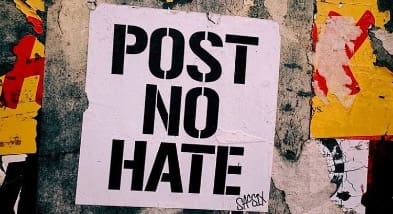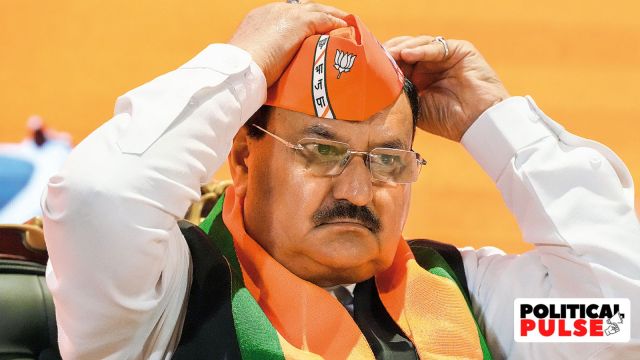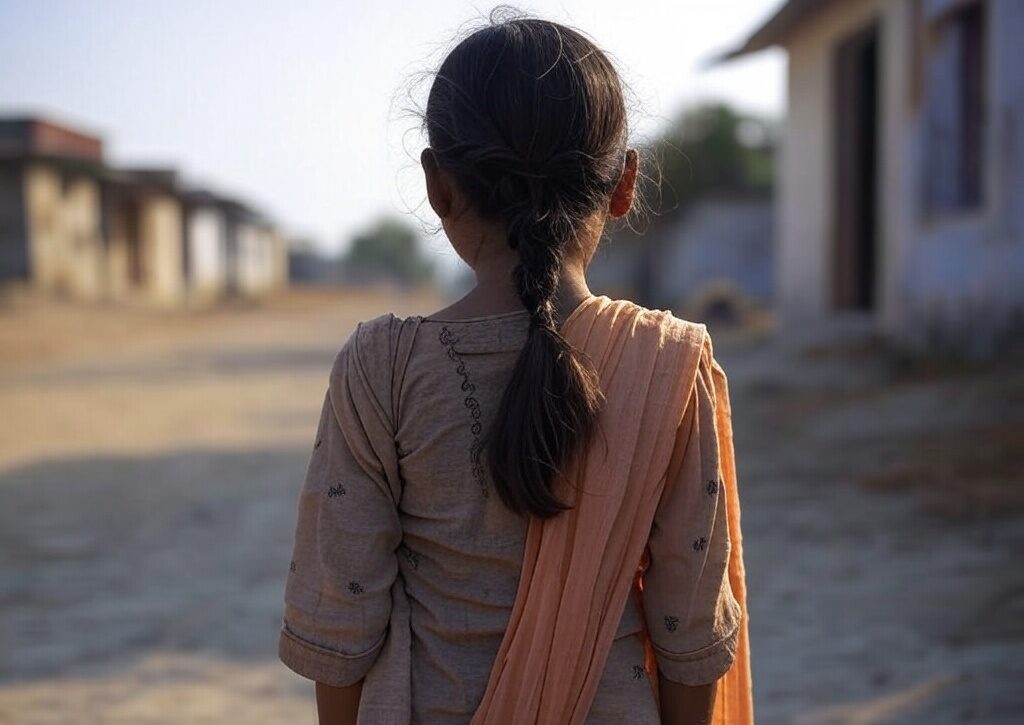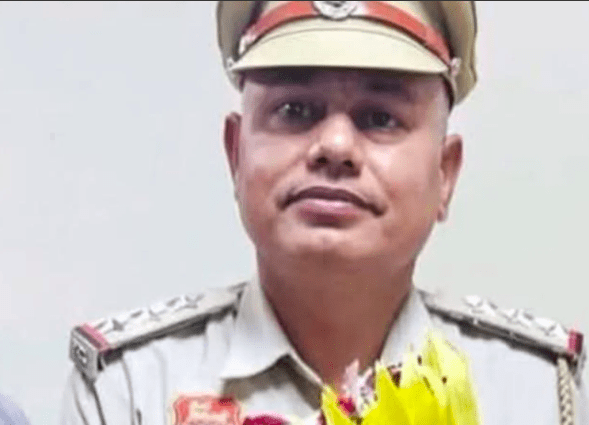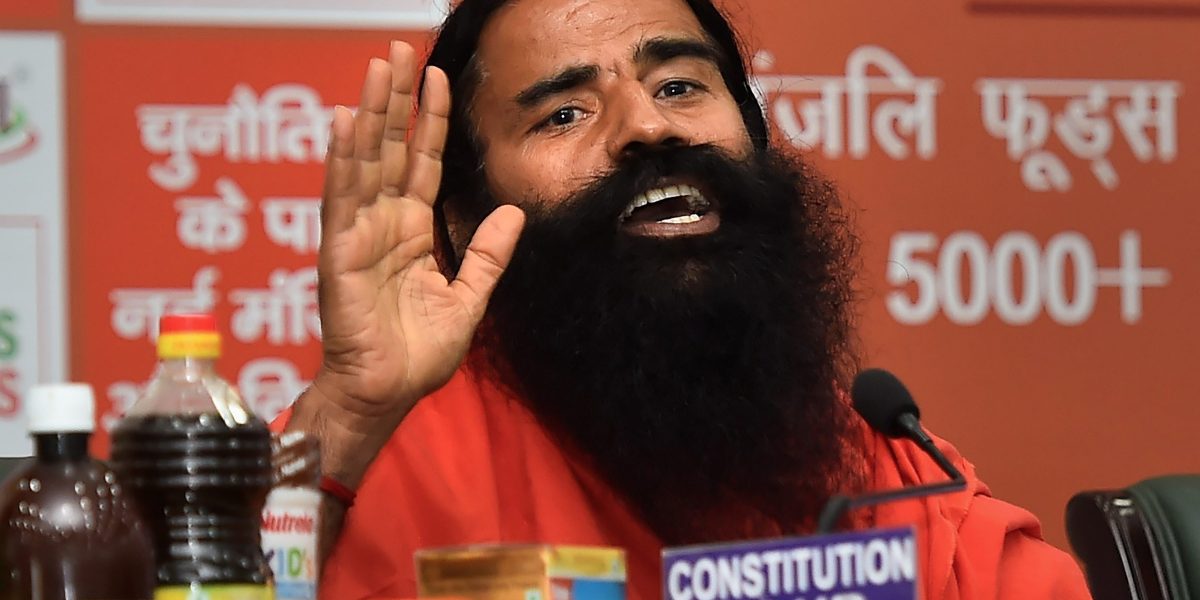
Srinagar: On 25 August, exactly eleven years since her brother died, vomiting blood from his bleeding lungs after a day and night in the custody of the Jammu and Kashmir (J&K) police, Urzeba Qayoom Bhat stood in Srinagar’s press enclave, silently holding up a handwritten placard. Bearing photos of her slain elder brother, the placard asked Prime Minister Narendra Modi to ensure justice in ‘new Kashmir’.
Among more than 120 people killed in the summer of 2010 when clashes broke out across the erstwhile state in one of the worst episodes of civilian unrest, 17-year-old Umar Qayoom Bhat was taken into preventive detention in Srinagar on 20 August 2010, released vomiting blood the next day, and died in hospital two days later.
The unrest was against the killing of three youth by the Indian Army in a fake encounter in north Kashmir’s Machil area. Then, 17-year-old student Tufail Mattoo was killed after police allegedly fired a tear gas canister at him from close range, and Srinagar quickly became the epicentre of the unrest.
From 2011 to 2018, the Bhats knocked on the doors of police officials and courts until a First Information Report (FIR) was finally registered, acknowledging Umar’s death after a night in police custody. “It is unfortunate that I had to fight for more than eight years just to get an FIR registered,” Abdul Qayoom, Umar’s father, told Article 14. “But I never lost hope.”
Three years have now lapsed since the FIR was filed, and there has been no progress in the investigation despite a court order in 2018 for the formation of a special investigation team.
On the 11th anniversary of her brother’s death, Urzeba, 25, stood in protest in the heart of Srinagar, her father Abdul Qayoom beside her. Qayoom said he wanted to know how much time the police would take to file a chargesheet against the men responsible for assaulting Umar in custody and his subsequent death.

Custodial torture during detention and investigation is a long-standing problem in Kashmir, with a 2019 report by research and advocacy organisations stating that 70% of the 432 survivors of torture they studied, occurring between 1990 and 2017, were civilians. These survivors had been stripped, beaten, electrocuted, forcibly deprived of sleep, suspended from the ceiling and more.
In 2008, the state police said at least 330 people died in their custody over 18 years, not including another 111 who had disappeared from custody. Police or magisterial investigations into these cases is rare.
“You can’t trust the police to investigate a complaint against the police,” former inspector general of Punjab police Chaman Lal told Article 14. Normal procedure in cases involving a custodial death is a judicial or magisterial enquiry, he said.
The long delay in filing an FIR and now a further delay in filing a chargesheet in the case of Umar Qayoom is a violation of Article 14 of the Constitution (equality before the law), said Lal, a Padma Shri awardee.
Inspector General of Police (Kashmir) Vijay Kumar did not respond to text messages from Article 14 seeking a comment on the reasons behind the long delay in filing a chargesheet in the Umar Qayoom custodial death case.
Article 14 approached then IG of the Kashmir range SM Sahai, former DGP Kuldeep Khoda and then senior superintendent of police Syed Ashiq Bukhari for their comments on the probe into Umar Qayoom’s custodial death, but none of them responded to phone calls.
Shafat Mohammad Najar, sub divisional police officer, Hazratbal, told Article 14 that the investigation into the case is underway. About the delay in submitting the chargesheet, he said only senior officials could comment. “But I must tell you that the investigation into the case is going on, and we are in touch with the family,” Najar said.
Detained At Protest, Assaulted In Custody
Urzeba vividly remembers the last time she saw her brother. It was Friday and Umar was headed to offer congregational prayers at a nearby mosque, a five-minute walk from their home.
Hurriyat leader Syed Ali Geelani had given the call for a shutdown, and the usual practice was to stage a protest after Friday prayers. As soon as namaaz was over, people started marching towards the main chowk (square) in Soura, according to Urzeba.
In a bid to stop the protest and detain protestors, police surrounded them in the chowk.
“Many fled, but policemen caught hold of my brother along with a few other teenagers from our area. They started beating my brother ruthlessly, on the spot,” she said.
Urzeba and her father heard a blow-by-blow account of the incident from two teenagers detained along with Umar. All three were detained on 20 August and released the subsequent day.
According to Urzeba, the assault on Umar continued for more than 30 minutes right there at Soura chowk. The three boys were subsequently bundled into a police jeep and taken to Soura police station.
In their home located just a stone’s throw from Soura Chowk, the Bhat family didn’t immediately know what was going on outside.
Soon, they began to hear sounds of the clashes between police and protestors. About 90 minutes after Umar had left the house, a worried Abdul Qayoom went outside to check on his son.
“My father saw Umar’s slippers lying there on the street in the chowk, which got him worried immediately,” the sister said. Meanwhile, some neighbours told Qayoom that Umar had been taken away by the police.
“He rushed to the police station, where he saw Umar lying on the floor in a cell,” Urzeba told Article 14.
The boy pleaded with his father to be taken to hospital, Urzeba said. He told his father he had been brutally thrashed.
Qayoom pleaded for his son to be released, but was forced out of the police station by policemen, according to Urzeba. “They threatened to detain him,” she said.
Bailed Out, Scan Showed Haemorrhaging Lungs
On 21 August, though Umar got bail from a local court around 1 pm, it was not until 7 pm that he was released from the Soura police station lock-up.
The family rushed him to Sher-I-Kashmir Institute of Medical Sciences (SKIMS), a government facility and Kashmir’s largest tertiary care hospital. The on-call doctor had a “cursory look”, according to Urzeba, and insisted her brother was okay.
The family took Umar to the hospital as soon as he was released from the lock-up, and according to Urzeba, doctors there seemed to be expecting him though the family had not called the hospital ahead.
A doctor was calling for Umar Qayoom even as they arrived in the out-patients’ department, she said. “We were surprised but we rushed Umar to him. He just checked him with a stethoscope and told my father he’s doing fine and we can take him home,” she said.
The family asked the doctor about the blood steadily oozing out of Umar’s mouth. According to Urzeba, the doctor told them it could be due to “body heat”.
Still worried, they returned home, where a number of visitors had gathered to see Umar. There were relatives, friends, and some neighbours who had heard that the youngster had been picked up by police.
“He wouldn’t allow anyone to touch his chest. Mae che lagan seen’as (My chest aches) he kept saying through the night,” his sister told Article 14.
According to the family, Umar was tortured in custody and probably suffered internal damage to his organs during a beating by police.
“They (police) had pushed nails into the soles of his feet. One could see the marks clearly,” she said.
On 22 August, the family took Umar back to SKIMS, where doctors allegedly once again dodged their requests for proper medical care.
When blood began to ooze out of his mouth past midnight, the family rushed him to hospital yet again on the morning of 23 August, when doctors now found the boy to be critical. According to Urzeba, they said he was “90% dead”.
Another doctor was on call, and he put Umar on ventilator support immediately.
According to hospital records accessed by Article 14, Umar was admitted on 23 August at 10:02 am, vomiting blood.
Medical documents show he was advised an X-ray of the chest, which showed bilateral diffuse haziness. A computed tomography (CT) of the chest showed bilateral massive intrapulmonary haemorrhage, or bleeding in both lungs.
Two days later, Umar was dead.
“The patient developed multiple episodes of cardiac arrest which he was revived twice but at 2:40 pm, the patient again had a cardiac arrest where he couldn’t be revived and was declared dead at 3:00 pm on 25 August 2010,” the death summary said.
According to the hospital death certificate, Umar succumbed to injuries due to “respiratory hypertension with severely deranged blood gases, diffuse intrapulmonary hemorrhage and blunt trauma on chest”. Umar had suffered one or more blows to the chest, causing bleeding in the chest cavity and compromised ventilation.
‘We Were Offered Money To Withdraw Case’
According to the family, a police team from Soura police station asked the family to bury Umar’s body as soon as possible, saying they would register an FIR and start an investigation into his death. A week later, when the family returned to the Soura police, the latter refused to register an FIR, according to Urzeba.
In March 2011, the family approached the court of the chief judicial magistrate (CJM), with an application to register an FIR against the policemen involved in Umar’s detention and custodial torture.
“We decided to fight the case. We were threatened and intimidated, I was even offered Rs 20 lakh by the police to withdraw the case, but nothing was going to stop me from seeking justice,” Qayoom told Article 14.
Qayoom is employed as a guard at the J&K Muslim Waqf Board in Srinagar. He earns a monthly salary of Rs 9,000. He is still to see the “light of justice”, he said, though all his meagre savings were exhausted on the case.
A visibly tired Qayoom said he is financially, physically and emotionally devastated.
The family does not allow Umar’s mother to speak to visitors about the incidents of August 2010, to protect her from a traumatic retelling of the story of how her only son died.
The family was represented first by Advocate Shabir Ahmad Bhat for seven years, before advocate Babar Qadri took it up in 2018.
On 20 August, 2018, the chief judicial magistrate of Srinagar ordered an FIR to be registered by the Soura police station. It had been eight years since Umar’s death.
Before the court passed the order, police submitted that Umar had been detained along with two others as a preventive measure, under sections 107 (for keeping peace) and 151 (arrest to prevent commission of offence) of the Code of Criminal Procedure, 1973 (CrPC).
The court also ordered formation of a special investigation team (SIT) headed by a senior superintendent of police. It ordered a separate investigation by the Kashmir divisional commissioner into why no FIR was registered in 2010 itself, and why inquest proceedings under section 176 of the CrPC were not completed.
The court asked the divisional commissioner to file a report within a month.
The FIR was duly registered, under section 302 (punishment for murder) of the Jammu and Kashmir Ranbir Penal Code (RPC). According to the family, none of the court’s other orders in the matter were complied with.
“The police didn’t even contact us once during the investigation. It simply meant they weren’t doing it,” Urzeba told Article 14.
Another setback followed when advocate Babar Qadri was shot dead by suspected militants on 24 September 2020 at his home in Srinagar.
“We felt we lost Umar again,” Urzeba told Article 14.
Since then the family has been pursuing the matter without a lawyer. The 25-year-old girl and her father are determined to seek the court’s intervention in ordering a chargesheet to be filed.
Inquiry Commission Recommended Case Against Police
In 2014, to probe the deaths of at least 120 people across the state during the summer unrest of 2010, the then state government constituted a one man commission headed by Justice (retd) ML Koul, under the Commissions of Inquiry Act, 1952.
Commissions constituted under this law have the powers of a civil court, and can summon witnesses, examine them on oath, receive evidence on affidavits and requisition public records.
The Koul commission took two years to probe the killings. It submitted its report to the state government in 2016.
In May 2018, the government informed the J&K High Court that it would not make public the report of the Koul Commission.
According to reports (here and here), the commission found that the forces fired on demonstrators without magisterial orders. It also said that both administration and police were “inactive” and “indolent” in tackling the law and order situation.
These reports said the Koul Commission also recommended registration of a murder case against police personnel responsible for the “custodial death” of Umar Qayoom.
The commission’s findings reportedly said, “We are satisfied with the contention of the petitioner that his son died because of police torture after he was arrested and are of firm opinion that this is a custodial death…”
The commission further recommended that a case be registered against the police officials of Soura police station who were responsible for the assault and on duty on 20 August 2010. It recommended a Central Bureau of Investigation probe into the killing of Tufail Mattoo.
However, Urzeba and Qayoom said the recommendations of the commission are yet to be implemented while the “culprits roam free”.
Shesh Paul Vaid, former DGP of J&K, told Article 14 the delay in filing a chargesheet could be on account of the fact that a probe is being conducted into an incident that is now more than a decade old.
Vaid, who was DGP when the valley witnessed more than 100 deaths of protesters following the killing of militant Burhan Wani in July 2016, said there are number of cases registered against police personnel involved in crimes, but if the police is not submitting a chargesheet, or if the the family does not trust the police investigation, they should approach the court seeking a probe by another agency.
Lal, the former Punjab IG, said the delay and poor compliance with set procedures are a sign of poor accountability.
“Unfortunately, there is no accountability and people think that they can get away with so many things that have happened and no action taken. That is why there is an impression that a culture of impunity has developed,” he said.
New Kashmir, Old Struggles For Justice
Along with helping her father do the rounds of courts, Urzeba has made a Facebook page where she posts reminders about the death of her brother.
“The idea is to keep reminding people…. I update people about the cases and I will keep doing it till the culprits are behind bars,” she said.
At her protest on 25 August, she boldly demanded answers from the prime minister about the justice system in the Valley.
“Since Prime Minister Modi talked about Naya Kashmir in 2019, I want to ask him where is justice in his Naya Kashmir? Does it take eight years to file an FIR and three years to file a chargesheet in Naya Kashmir?” she said later, speaking to reporters. She was hopeful their protest would draw the country’s attention.
“But I was disappointed,” Urzeba told Article 14 a few days later. Barring Kashmir Observer and Kashmir Reader, none of the newspapers published news of her protest.
The family has already approached the J&K State Human Rights Commission, the National Human Rights Commission, and the J&K grievance cell, a single-window portal for citizens to register grievances with and seek responses from departments of the government, but to no avail.
According to the family, the court had earlier given 42 days to the police to present in court those involved in the crime, but neither were any accused produced nor any action taken.
This story first appeared on article-14.com


